US employment lawyer Scott Cruz’s phone has been ringing off the hook in recent weeks as clients scramble to put in place obligatory “vaccine or test” policies for all workers.
He has been fielding very different calls since Thursday, when the Supreme Court blocked President Joe Biden’s federal mandate and handed control back to companies and states to decide their own Covid-19 inoculation regimes.
Small and medium-sized companies are “breathing a sigh of relief”, according to Cruz, who works for law firm Greensfelder in Chicago. While the mandate was a “great source of work” for people in his profession, “for clients it was an administrative and logistical nightmare . . . not many of them were happy about it”.
The change is the latest hurdle for global companies struggling with how to approach worker vaccinations. With a tangle of labour laws to navigate in each country they operate and facing different levels of government willingness to legislate, the result is a patchwork of policies and a potential mountain of litigation.
Even before Biden made his demand, the stance of US companies on employee vaccines had been among the toughest in the world.
United Airlines last year fired almost 200 employees who failed to provide proof of vaccination or exemption. The company told the Financial Times on Thursday it would not be changing its policy, which predated Biden’s move.
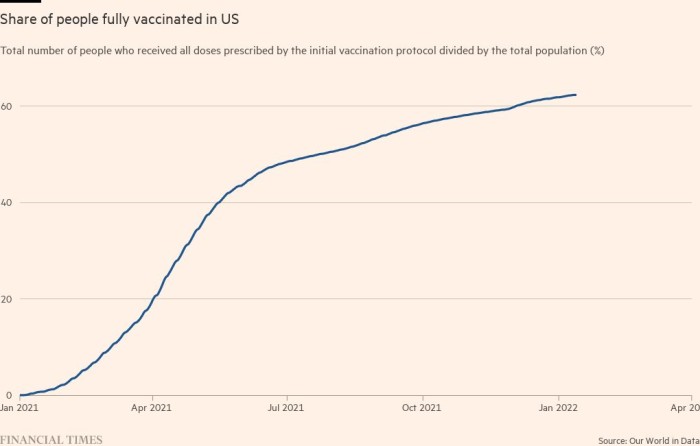
In a memo to staff this week, seen by the Financial Times, chief executive Scott Kirby said there were “approximately 8-10 United employees who are alive today because of our vaccine requirement”. Before the policy came in, he added, one employee a week was dying of Covid-19 on average. A judge sided with United in November when six employees sought to block the airline’s policy.
Citigroup has also demanded workers be vaccinated by January 14 or face the sack. In an update on Thursday by its head of HR, the bank said 99 per cent of its workers had been vaccinated or were exempt for approved reasons.
US labour laws give employers wide discretion over their vaccine policies.
“The US is the only country in the world with the concept of at-will employment,” said Devjani Mishra, partner at law firm Littler in New York. “Most workers don’t have an employment contract or entitlement to employment for a specific period of time — unlike most of Europe where you have contractual protections . . so in general terms, US companies have far more leeway to require the vaccine as a condition of employment.”
However, differing state and local rules complicate matters. New York City requires all on-site workers to be vaccinated, while such a rule is banned in Florida if employers do not provide certain exemptions — with the exception of healthcare workers, whom the Supreme Court ruled must be inoculated.
In the UK, the threat of discrimination claims has largely stopped companies from requiring vaccination, but lawyers said the “mood” was changing in light of new legislation obliging care home workers and frontline health and social care staff to be jabbed.
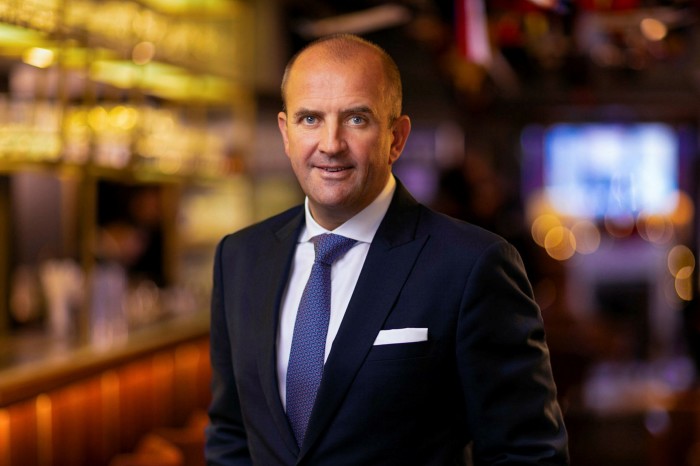
Stuart Procter, chief operating officer of hotel group the Stafford Collection, is strongly encouraging staff to be jabbed but too wary of the risk of lawsuits to take action against those who refuse.
“We had a case here where a young man who was an anti-vaxxer got Covid-19 and the whole concierge and porter department had to self isolate,” he said. “That is exceptionally frustrating, because the team that got wiped out had all been vaccinated. But legally you can’t force it.”
UK companies have started removing benefits to unvaccinated workers. Retailers Next and Ikea are offering only statutory sick pay, rather than the enhanced company rate, to unvaccinated staff who need to self isolate. Other companies, including law firm Debevoise & Plimpton, have banned workers from the office without proof of vaccination.
“The fact that Next has made this move may illustrate a shifting mood for employers on the vaccination issue,” said Richard Fox, partner at law firm Kingsley Napley. “Whereas employers adopting a policy of “no jab, no job” or now “no vax, less sick pay” may have been seen as extreme or outliers until now, we are seeing employers becoming increasingly emboldened.”
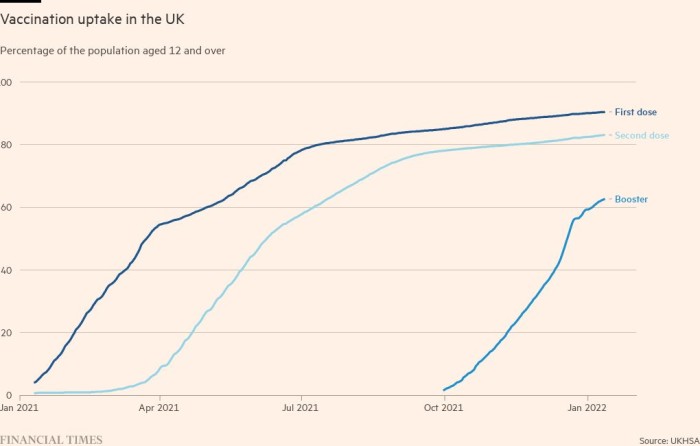
In the US, companies including fund manager Vanguard have sought to cajole workers with financial incentives. Vanguard is offering unvaccinated staff a $1,000 bonus to get jabbed. Retailers Kroger and Bolthouse farms have offered similar payouts.
In countries such as France and Italy, tough government stances are already leading to employment claims from unvaccinated public health workers, employment lawyers say.
According to Anne-Laure Périès, partner at Capstan Avocats, workers have argued at industrial tribunals and in administrative courts that compulsory vaccination is an attack on physical integrity or inhumane treatment, and that being sacked for refusing amounted to discrimination. Most workers’ claims had been rejected, she said, but not all.
Italy is also set from February to compel over-50s in the workplace to be vaccinated or face suspension without pay.
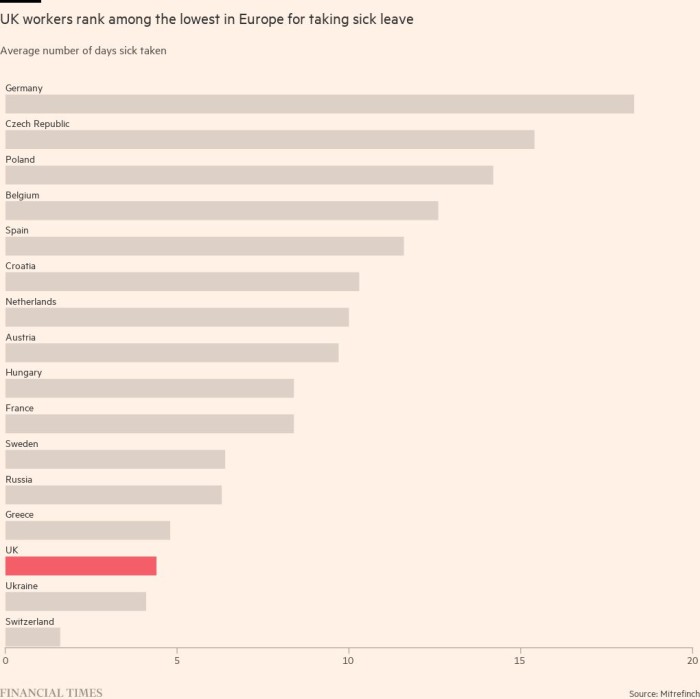
Lawyers in the UK are not yet seeing tribunal cases related to vaccination. But they are expecting them and say cases are likely to rest on whether a worker could claim hesitancy qualified as a religious or philosophical belief worthy of protection under the law. However, they suggested companies would probably be able to mount successful defences on health and safety grounds.
Previous Covid-related UK unfair dismissal cases have generally not gone in workers’ favour. In recent months employers have won cases involving an employee sacked for refusing to wear a mask and one fired for having attended a party during lockdown.
James Davies, employment partner at Lewis Silkin, said clients were seeking to bring in uniform global policies to avoid confusion, and that while “pretty much nobody” was seeking mandatory vaccination for all employees, some were “asking about it”.
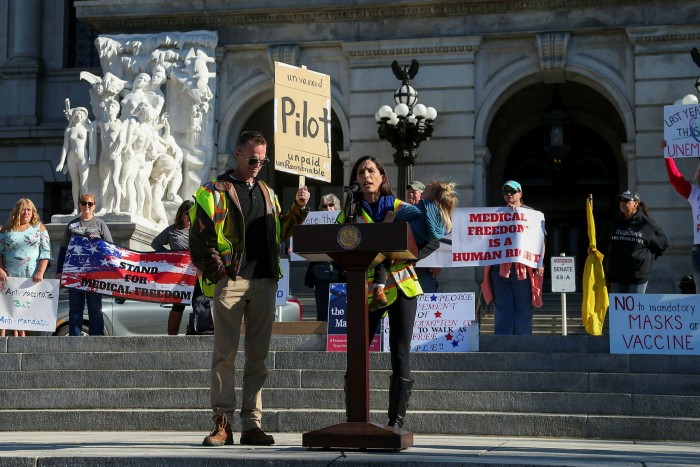
Mishra said vaccination was a punitively expensive issue for US companies, which shoulder healthcare insurance costs for their workers. With many clients setting policy “on a country by country basis”, she added, there were “gymnastics involved.”
One lawyer based in the London office of a large US law firm that requires proof of vaccination from US workers but not UK staff said he would not take the vaccine even if it meant being barred from the office.
“I am not vaccinated and there is nothing that would make me touch it,” he said. “In the US, our policy is that you have to be jabbed to go into the office. I think firms mandating it is a dangerous course of action.”
Additional reporting by Jyoti Mann and Delphine Strauss
Stay connected with us on social media platform for instant update click here to join our Twitter, & Facebook
We are now on Telegram. Click here to join our channel (@TechiUpdate) and stay updated with the latest Technology headlines.
For all the latest Health & Fitness News Click Here
